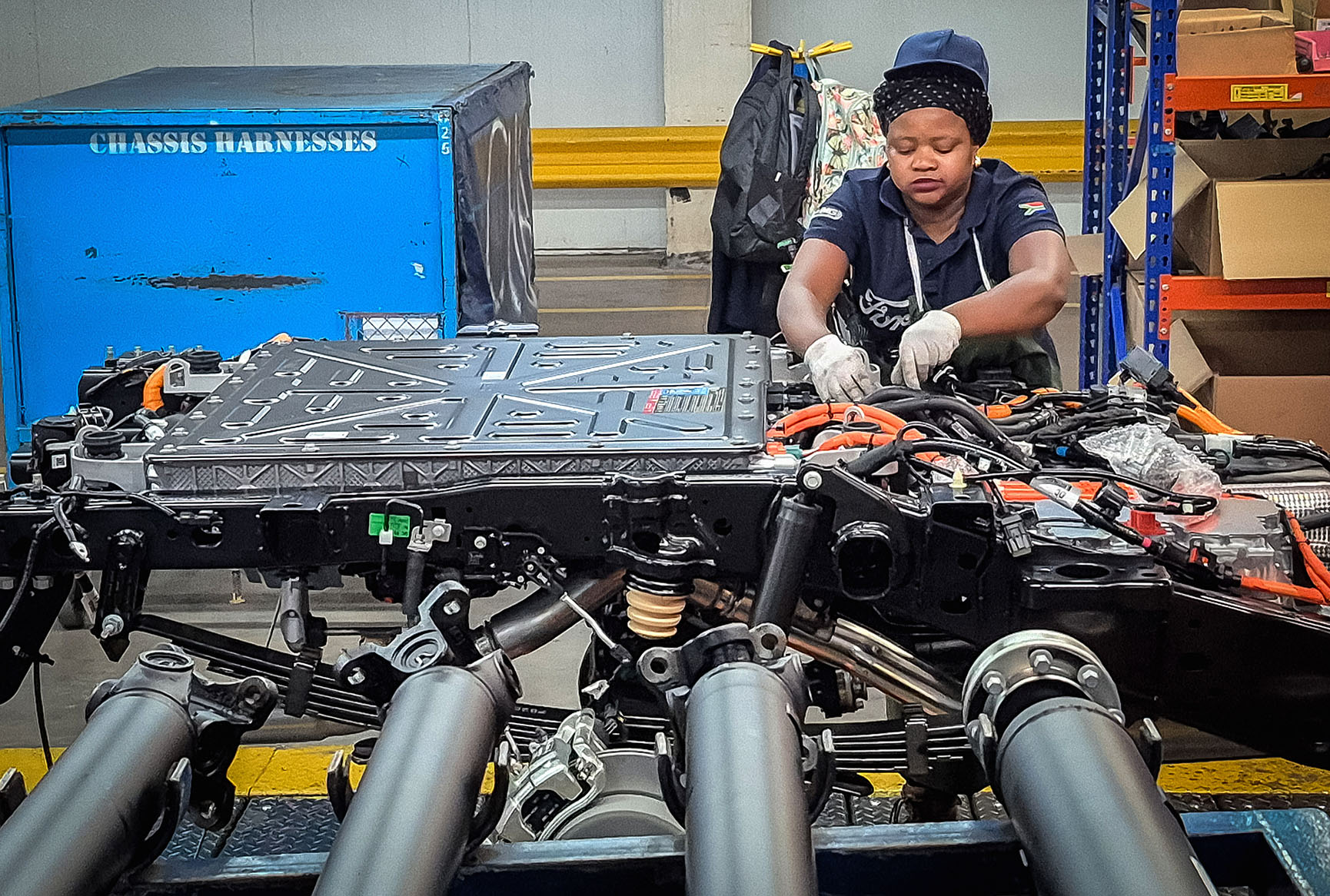Ford’s Pretoria facility, the only plant globally manufacturing the Ranger Plug-In Hybrid Electric Vehicle (PHEV), is set to export the vehicles to Europe, Australia and New Zealand – with the first shipment to Europe already outbound.
The South African-made Ranger PHEV enters an increasingly competitive global electric vehicle (EV) market, but its importance extends well beyond technical innovation. For South Africa, it is a rare combination of industrial pride, employment opportunity and looming geopolitical risk.
What’s at stake?
For all the project’s technical success, it remains vulnerable to geopolitics – Ford’s South African operations are owned by a US parent company, meaning any deterioration in US-SA trade relations could have serious implications, which, as the last few months have clearly illustrated, are tenuous at best.
Ford Manufacturing’s Ockert Berry is frank in talking to Daily Maverick: “It keeps me up at night,” he says, citing 5,300 direct employees, 60,000 in the supply chain and countless more jobs possibly at risk should US-SA relations affect the plant.
“That’s just for Ford. If all the OEMs (original equipment manufacturers) were affected, I don’t know what the country would do.”
Silverton is partly shielded by its export focus outside the United States, with the vehicles it produces not destined for US markets, meaning Agoa (African Growth and Opportunity Act) or other US policy changes may not have immediate effects on its viability.
Still, Ford receives regular questions from global leadership about South Africa’s political stability, Berry says. “We try to explain it, to give context. But we watch the headlines too.”
Silverton becomes a global hub
The Ranger PHEV is not Ford’s first electric offering, but it represents a shift in how the company allocates global production. That this vehicle, combining a 2.3 litre EcoBoost engine, 75kW electric motor and an 11.8kWh battery, will be produced only in South Africa, is a strategic move grounded in cost, quality and trade conditions.
“About five years ago, we decided to compete with the best,” says Berry. “That transformation, not just of the facility but of the people, is why we’re here now.”
Silverton’s current capacity sits at 200,000 vehicles a year – around 720 a day – with 200 a day of those now dedicated to the PHEV.
What makes the move more significant is that Ford has invested heavily in localising high-voltage assembly capabilities. The newly constructed battery assembly plant is capable of producing 62,000 battery packs a year, with a hybrid conveyor system, vacuum-based testing and high-voltage safety protocols that meet global compliance standards.
Silverton has also quietly emerged as a training ground for Ford’s future leadership. The last three global managing directors of Ford spent part of their careers at the Pretoria facility – a testament to its role in shaping strategic talent within the company.
PHEVs and the market Ford wants
While global EV sales continue to climb, the Ranger PHEV is built for markets that straddle the line between full electrification and practical compromise. The model’s appeal lies in its range, towing capacity and a feature called Pro Power Onboard, which allows it to serve as a mobile generator – ideal for users in rural areas or off-grid conditions.
Berry believes the PHEV model is an ideal transitional product for regions such as South Africa, which lack sufficient charging infrastructure. “We struggle with electricity at best,” he says, adding that this kind of interim solution makes sense for both industry and consumers.
Yet the PHEV is not slated for South African roads just yet, with Ford still to decide if local roll-out is viable. Meanwhile, countries with existing trade agreements and infrastructure – chiefly in Europe, Australia and New Zealand – will be the primary destinations.
A plant remade for a greener future
The PHEV roll-out is accompanied by a broad set of environmental and sustainability upgrades at Silverton; A solar carport with more than 30,000 panels generates 13.4MW – enough to power daytime operations. Paintshop upgrades will enhance energy efficiency, and new water recycling initiatives are already saving more than 14,000 cubic metres of water annually, according to Ford’s data.
Ford’s waste strategy is also shifting: an on-site scrapyard now allows for in-house sorting and recycling, part of the company’s broader goal to reach zero landfill waste across its global operations.
Who really benefits?
Berry is candid about the economics: Silverton doesn’t book profits locally. Operating on a cost-per-unit transfer model, the vehicles are exported to Europe where profits are declared. “We don’t make margins here. We create jobs,” he says.
That local benefit – jobs, training, supply chain development – is tangible. Technicians and operators now undergo structured EV-related training, from basic awareness (Level 0) to full high-voltage system mastery (Level 3). Unlike most EVs shipped fully built, Silverton handles local battery assembly.
In a market increasingly crowded with exclusively imported EVs, that localisation matters. South Africa’s ability to produce next-generation vehicles and not just consume them could prove to be a strategic economic lever.
The real challenge will be to keep it.
Ford has made clear that Silverton must remain globally competitive to be considered for future models. “We want to be the best Ranger plant in the world,” Berry says. That target, he notes, is not for prestige, but survival. As investment decisions tighten, every plant within the group competes.
In today’s landscape, politics is part of that competition.
Whether Silverton secures that future may depend as much on Pretoria and Washington as it does on Pretoria’s production line. DM





